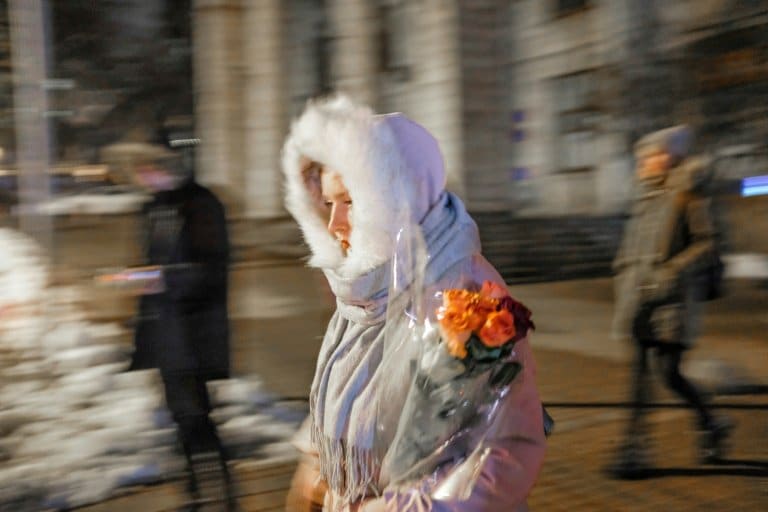Ukraine battles to restore power after latest Russian barrage

Ukraine struggled Thursday to repair its battered power and water services after Russia targeted the electricity grid with dozens of cruise missiles and temperatures plunged.
The Ukrainian energy system is on the brink of collapse and millions have been subjected to emergency blackouts for weeks due to systematic Russian bombardments of the grid.
The World Health Organisation has warned of “life-threatening” consequences and estimated that millions could leave their homes as a result.

War in Ukraine / © AFP
“Seventy percent of the capital remains without electricity,” Klitschko said. “Energy companies are making every effort to return it as soon as possible,” he added.
Kyiv shivered Thursday as temperatures hovered just above zero degrees Celsius (32 degrees Fahrenheit) with some rain.
Ukraine’s military accused Russian forces of firing around 70 cruise missiles at targets across the country on Wednesday and of deploying attack drones.
Ten people were killed and around 50 wounded, Ukrainian Prosecutor General Andriy Kostin told local media.
But Russia’s defence ministry denied striking any targets inside Kyiv and said damage in the capital was the result of Ukrainian and foreign air defence systems.
– ‘Scariest day’ –
“Not a single strike was made on targets within the city of Kyiv,” it said.

Vyshgorod on the outskirts of Kyiv was hit by Russian strikes on Wednesday / © AFP
Moscow’s targeting of power facilities is their bid to force capitulation after nine months of war that has seen Russian forces fail in most of their stated territorial objectives.
“So many victims, so many houses ruined,” 52-year-old Iryna Shyrokova told AFP in Vyshgorod on the outskirts of Kyiv after Wednesday’s Russian strikes.
“People have nowhere to live, nowhere to sleep. It’s cold. I can’t explain it. What for? We are also human beings,” she said, calling it “the scariest day”.
This month Moscow’s troops withdrew from the only regional capital they had captured, destroying key infrastructure as they retreated from Kherson in the south.
Kostin said Ukrainian authorities had discovered a total of nine torture sites used by the Russians in Kherson as well as “the bodies of 432 killed civilians”. He did not specify how they were killed.
Wednesday’s attacks disconnected three Ukrainian nuclear plants automatically from the national grid and provoked blackouts in neighbouring Moldova, whose energy network is linked to Ukraine.

A woman walks on the street during a blackout in the western Ukrainian city of Lviv on Wednesday / © AFP
Ukraine’s energy ministry said that all three nuclear facilities had been reconnected by Thursday morning.
The governor of Kharkiv region — home to the country’s second largest city — said the eponymous city was suffering electricity supply issues and “emergency power shutdowns”.
The head of the central region of Poltava, Dmytro Lunin, said authorities were “working around the clock to restore power”.
– ‘Shutdowns’ –
“In the coming hours, we will start supplying energy to critical infrastructure and then to the majority of households,” Lunin said.

Residents stand next to items rescued from a damaged residential building after a Russian strike in Vyshgorod / © AFP
About 50 percent of central Dnipropetrovsk region had electricity, governor Valentyn Reznichenko said.
“The energy supply situation is complicated. So shutdowns will continue in the region to reduce the pressure on the grid as much as possible,” Reznichenko warned.
Repair work was ongoing elsewhere, including in the Rivne, Cherkasy, Kirovograd and Zhytomyr regions, officials said.
The Kremlin said Ukraine was ultimately responsible for the fallout from the strikes and that Kyiv could end the strikes by acquiescing to Russian demands.
Ukraine “has every opportunity to settle the situation, to fulfil Russia’s demands and as a result, end all possible suffering of the civilian population,” spokesman Dmitry Peskov said.
Moscow announced separately it had issued tens of thousands of Russian passports to residents of four Ukrainian territories, which President Vladimir Putin claimed to have annexed in September.
“More than 80,000 people received passports as citizens of the Russian Federation,” Valentina Kazakova, a migration official with the interior ministry, said in remarks carried by Russian news agencies.
In September, Russia held so called referendums in Donetsk, Lugansk, Zaporizhzhia and Kherson and claimed residents had voted in favour of becoming subjects of Russia.
Putin formally annexed the territories at a ceremony in the Kremlin later that month, even though his forces have never had full control over them.





